Landwind X6
The Landwind X6 is a SUV produced by Jiangling Motor Holding, a joint venture between Changan Auto and Jiangling Motors Corporation Group (JMCG).
| Landwind X6 | |
|---|---|
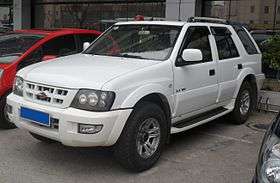 Jiangling Landwind X6 in Shanghai | |
| Overview | |
| Manufacturer | Landwind (Jiangling Motor Holding) |
| Also called | Landwind X9 (3-door version) Landwind X-Pedition Jiangling Baowei Jiangling Baodian JMC Boarding |
| Production | 2001–2009 (Landwind) 2005–2016 (Jiangling) |
| Assembly | Nanchang, Jiangxi, China |
| Body and chassis | |
| Class | Mid-size SUV |
| Body style | 3-door SUV (X9) 5-door SUV 4-door pickup (Jiangling Baodian/JMC Boarding) |
| Powertrain | |
| Engine | 1.8 L 4G18 I4 petrol 2.0 L 4G63 I4 petrol 2.4 L 4G64 I4 petrol 2.4 L 4G69 I4 petrol 2.8 L 4JB1 I4 diesel 2.9 L JX4D30 I4 diesel |
| Transmission | 5-speed manual 6-speed manual |
| Dimensions | |
| Wheelbase | 3,025 mm (119.1 in)–3,380 mm (133.1 in) (Baodian) |
| Length | 5,050 mm (198.8 in)–5,405 mm (212.8 in) (Baodian) 5,115 mm (201.4 in) (Baowei) |
| Width | 1,690 mm (66.5 in)–1,720 mm (67.7 in) (Baodian) 1,860 mm (73.2 in) (Baowei) |
| Height | 1,645 mm (64.8 in)–1,710 mm (67.3 in) (Baodian) 1,795 mm (70.7 in) (Baowei) |
| Chronology | |
| Successor | Yusheng S350 (SUV) JMC Yuhu (Pickup) |
Like some Chinese-made cars, the JMC Landwind is widely derived from older imported technology and design, in this case the Isuzu Rodeo, which was sold from 1998 to 2004.
In China the SUV is sold under the name of Jiangling Baowei and it is also available as a pickup truck called the Jiangling Baodian. The Baodian is exported as the "JMC Boarding" to Asian, South American, and African markets (amongst others).
Engines
The European market Landwinds are available with two Mitsubishi-built gasoline-powered engines and one Isuzu-built diesel engine.
- 2.0 L - 115 hp (84 kW)
- 2.4 L - 125 hp (92 kW)
- 2.8 L diesel - 92 hp (68 kW)
Controversy
The Landwind has attracted a controversy after a series of safety tests. The car made headlines after German car club ADAC showed in its crash test, carried out for EuroNCAP, that a driver of this vehicle would not survive a head-on collision at 64 km/h (40 MPH).
The Dutch importer of the Landwind called for a test by German safety monitoring agency TÜV to show that the car was in fact safe enough for European standards. These tests are similar to the EuroNCAP tests, but the collision speed is lower at 56 km/h (35 mph). Despite the worst crash results in decades TÜV subsequently confirmed that the Landwind met all mandatory safety criteria according to ECE R94.
The controversy did not end there. Opponents say the TÜV test is not enough to guarantee vehicle safety today. They claim that R94 is outdated and only guarantees that the driver will be alive after a crash, and that it does not take into account serious injuries such as severe crushing of the legs. R94 is also performed at a lower speed.
Ron Zwaans, general director of Landwind Europe, says his company is working together with ADAC to keep improving the Landwind's safety. He claims his goal is to ultimately pass the more rigorous EuroNCAP testing.
Further controversy arose from 2014 onwards, with Landwind's introduction of its follow on Landwind X7 SUV, which was quickly noted to closely visually resemble Jaguar Land Rover's Range Rover Evoque.[1]
2006 Paris Motor Show
At the 2006 Paris Motor Show, Landwind displayed an updated version of its SUV, called X-Pedition, as well as an MPV called the Fashion (Landwind CV9) that would compete in the same size class with MPVs such as the Kia Carens.
Gallery
- Landwind X6 pre-facelift
- Landwind X6 pre-facelift rear
 Landwind X6 post-facelift
Landwind X6 post-facelift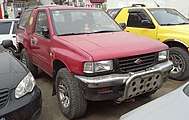 Landwind X9 pre-facelift
Landwind X9 pre-facelift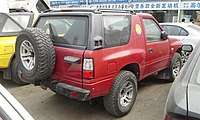 Landwind X9 pre-facelift rear
Landwind X9 pre-facelift rear- Landwind X9 post-facelift
- Landwind X9 post-facelift rear
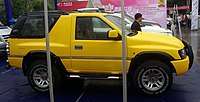 Landwind X9 post-facelift side
Landwind X9 post-facelift side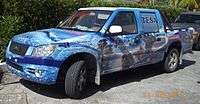 JMC Boarding pick-up in Mexico
JMC Boarding pick-up in Mexico.jpg) JMC Boarding pick-up front
JMC Boarding pick-up front.jpg) JMC Boarding pick-up rear
JMC Boarding pick-up rear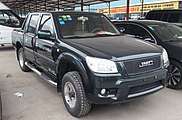 Jiangling Baodian
Jiangling Baodian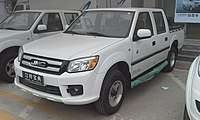 Jiangling Baodian facelift
Jiangling Baodian facelift
References
- Zhang, Benjamin (10 August 2015). "China has knocked off a Range Rover and is selling it at a third of the price of the real thing". Business Insider UK. Retrieved 11 August 2015.
External links
| Wikimedia Commons has media related to Landwind X6. |
- Landwind
- Landwind 'X' range of SUVs
- Official Jiangling website for Europe
- Chinese 4x4 gets zero in safety test
- Chinese Car Passes New Crash Test in Germany
- View ADAC crash test
- Jiangling Landwind X6 Crash Test - Passenger Cabin
- Jiangling Landwind X6 Crash Test - Outside View
- Jiangling Landwind X6 Crash Test by TUV
- Jiangling Landwind X6 gets zero in crash test